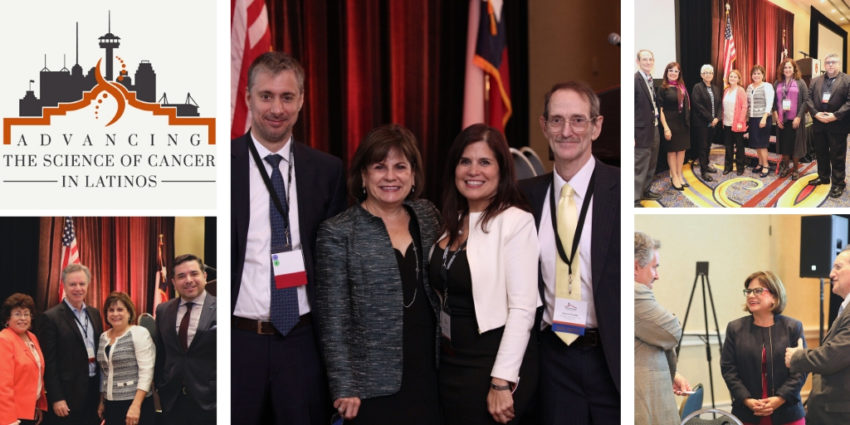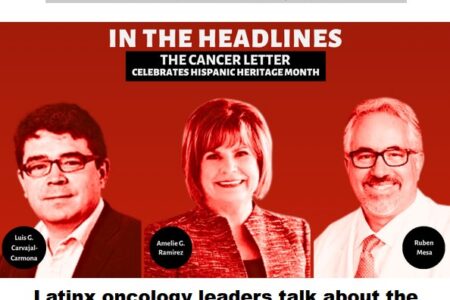
Share On Social!
Latinos are expected to see a 142% rise in cancer cases in coming years.
To address this pressing health concern, Dr. Amelie G. Ramirez of UT Health San Antonio is leading the 2nd Advancing the Science of Cancer in Latinos conference Feb. 26-28 at the Marriott Plaza San Antonio hotel.
The conference will unite researchers, oncologists, physicians, community leaders, policymakers and students to tackle Latino cancer on many fronts.
The conference will build on progress made at the inaugural conference, founded by UT Health San Antonio in 2018, which featured 225 cancer experts from 23 states. The proceedings from this conference were released in fall 2019 in Springer Open Books.
“We are looking forward to gathering the brightest scientists, clinicians, advocates and students to share what they’re learned about cancer in Latinos and collaborate on innovative solutions,” said Amelie Ramirez, Dr.P.H., who directs Salud America! at UT Health San Antonio’s Institute for Health Promotion Research. The IHPR will co-host the conference with the Mays Cancer Center.
‘Advancing the Science of Cancer in Latinos’ Conference Details
The conference will address the unique impact of cancer on Latinos, which as a group have high rates of certain cancers — liver, stomach, cervical and childhood leukemia — and poor outcomes in others.

Keynote speakers will address these disparities, including:
- Sandro Galea, dean of the Boston University School of Public Health and one of the “World’s Most Influential Scientific Minds,” speaking on “Health Haves, Health Have Nots, and the Future of Population Health”
- Douglas Lowy, principal deputy director of the National Cancer Institute (NCI) at the National Institutes of Health (NIH), speaking on important national cancer updates
- Eliseo Perez-Stable, director of the National Institute on Minority Health and Health Disparities at the NIH, speaking on “The Science of Latino Cancer”
- Felicia Knaul, director of the Miami Institute for the Americas at the University of Miami College of Arts & Sciences, speaking on “Closing the Cancer Divide: Global Challenges and Opportunities”
“These and other presenters will unveil Latino-focused lab research, clinical best practices and community interventions to stimulate multidisciplinary collaborations for cancer solutions that touch on genetics, biological differences, access to care, screening tests, incidence and mortality rates, survivorship and quality of life,” Dr. Ramirez said.
‘Advancing the Science of Cancer in Latinos’ Conference Leadership

In addition to Dr. Ramirez, the conference’s planning committee includes:
- Edward J. Trapido, Sc.D., FACE, Program Co-Chair, Louisiana State University
- Adelaida M. Rosario, Ph.D., National Institute on Minority Health and Health Disparities
- Ana Carla Cepeda Lopez, Ph.D., Universidad de Monterrey
- Anna M. Napoles, M.P.H., Ph.D., National Institute on Minority Health and Health Disparities
- Barbara Segarra Vasquez, M.T., D.H.Sc., University of Puerto Rico
- Filipa C. Lynce, M.D., Georgetown University
- Frank J. Penedo, Ph.D., University of Miami
- Laura Fejerman, Ph.D., University of California San Francisco
- Laura Magana Valladares, Ph.D., Association of Schools and Programs of Public Health
- Laura Tenner, M.D., UT Health San Antonio
- Mariana C. Stern, Ph.D., University of Southern California
- Martin Mendoza, Ph.D., U.S. Department of Health and Human Services, Office of Minority Health
- Matthew P. Banegas, Ph.D., M.P.H., Kaiser Permanente
- Patricia I. Moreno, Ph.D., Northwestern University
- Paulo Pinheiro, M.D., M.Sc., Ph.D., University of Miami
- Sandi Stanford, Alamo Breast Cancer Foundation
“Our committee is excited to celebrate research advancements to date, explore new frontiers and gaps in this emerging transdisciplinary field, and kick-start discussion on research from bench to bedside to community to survivorship,” said Dr. Ramirez along with LSU’s Dr. Trapido.
For more information, visit LatinoCancer.com or email LatinoCancer@uthscsa.edu.
The conference hashtag is #LatinoCancer2020. Follow along!
By The Numbers
142
Percent
Expected rise in Latino cancer cases in coming years



